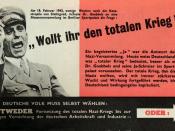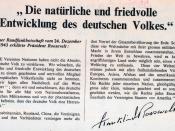Since the beginning of time, when men could barely communicate and modern technology was only a dream, war has been prevalent as a means to attain glory, land and personal wealth. Although motives and weapons have evolved, war has been a common occurrence aimed at securing nationalistic goals or heightening fame and fortune. There are however, two types of wars. The more common and stereotypical is a physical war where people are killed and injured and victory is attained by annihilating the enemy or destroying its territory. The other type of war is the moral war, the war on the mind. The war on the mind, also known as psychological warfare, can, if used properly, be a very effective means of assuring victory and success. It is a bloodless war that Edward Hunter likens to communism, which infests the minds of the people, turning them into slaves of the tyrant.
"Great areas with enormous populations have fallen into the hands of the Reds, not through any approximations of the democratic process but through sheer power pressures, psychological warfare."(Edward Hunter) In a sense, the war on the mind is waged in order to convince the enemy that resistance is futile, to change the enemy's perspective on the war's outcome so that their views correlate more directly with those of the attackers. Psychological warfare can be used by itself or jointly with conventional military efforts to maximize the chances for victory.
There are many ways to reap the benefits of psychological warfare. From America's "Shock and Awe" strategy of intense aerial bombardment of Iraq to simple propaganda to terrorism, psychological warfare has many devilish heads, each potent and powerful if used correctly. President Dwight D. Eisenhower characterized psychological warfare as anything "from the singing of a beautiful anthem up to the most...


